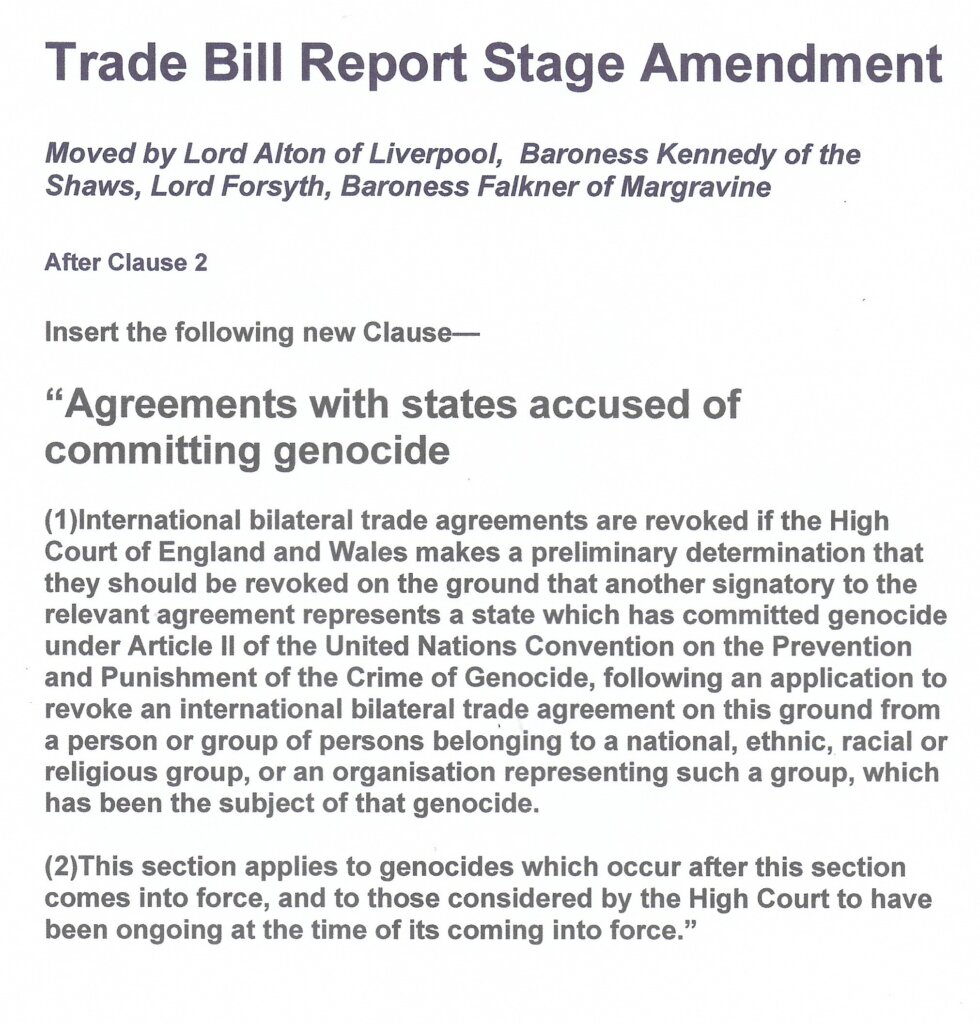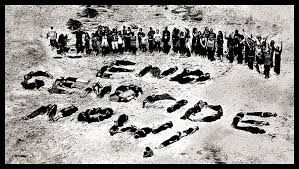
BRIEFING: TRADE BILL AMENDMENT
TRADING WITH COUNTRIES ALLEGED TO BE INVOLVED IN GENOCIDE AMENDMENT
Agreements with states accused of committing genocide
(1) International bilateral trade agreements are revoked if the High Court of England and Wales makes a preliminary determination that they should be revoked on the ground that another signatory to the relevant agreement
represents a state which has committed genocide under Article II of the United Nations Convention on the Prevention and Punishment of the Crime of Genocide, following an application to revoke an international bilateral trade
agreement on this ground from a person or group of persons belonging to a national, ethnic, racial or religious group, or an organisation representing such a group, which has been the subject of that genocide.
(2) This section applies to genocides which occur after this section comes into force, and to those considered by the High Court to have been ongoing at the time of its coming into force.
WHY IS THE AMENDMENT NEEDED?
The UK is in danger of defaulting on its commitments under the Genocide Convention. UK policy for many years has been that:
“…the recognition of genocide is a matter for judicial decision, rather than for
governments or non-judicial bodies.”
https://questions-statements.parliament.uk/written-questions/detail/2016-06-20/HL758
Yet the international judicial system is not functioning as intended. Despite mounting evidence of atrocities in the Uyghur Region of China, for example, there is little realistic
prospect of a referral to the International Criminal Court from the UN Security Council – China is expected to veto such an effort.
When the UK acceded to the Genocide Convention, it committed to prevent and punish genocide. By operating a policy which attempts to outsource convention obligations to a system where genocide determination is blocked, we are in danger of defaulting on those obligations.
WHAT WOULD BE THE DUTIES UPON THE UK IF THE COURTS FIND GENOCIDE?
The amendment is proportionate and limited in impact. The finding of the Court would have an impact only on trade deals where one of the parties to such an agreement were
found to have committed genocide.
Sir Geoffrey Nice QC:
“The obligation would be, as set out, to revoke the relevant International Trade Agreement, consistent with the core undertaking under Article 1 to prevent and punish. This is manifestly proportionate. No well-ordered state would want to be trading with a genocidal State.“
WHAT ARE THE LIKELY ARGUMENTS AGAINST THE AMENDMENT?
- Genocide determination should be reserved to the Secretary of State
This contradicts the long-standing policy of the UK that genocide determination should be
a legal, not a political, matter. - Sir Geoffrey Nice QC
“There is no reason to believe ministers would behave differently from now on from
how they have behaved in the past. Only by an embedded defined scope of the
undertaking can the duty imposed by the undertaking be recognised and honoured.“ - This might apply to past genocides and preclude trade deals with many countries
The amendment explicitly excludes past genocides in the second part of the clause which
reads:
(2) This section applies to genocides which occur after this section comes into
force, and to those considered by the High Court to have been ongoing at the
time of its coming into force. - This amendment makes the UN system for determining genocide redundant
It does not. The amendment enables a preliminary determination of genocide. It
complements a UN mandated determination. A full determination can and should be
pursued through the international system and followed by prosecution. A preliminary
determination allows the government credibly to use the word genocide to describe
atrocities, and to use such a determination to ensure that we do not pursue trade
agreements with genocidal states. - Sir Geoffrey Nice QC
“It would also discourage, and probably significantly reduce, casual and often
instrumental assertions that genocide is being committed. Once the amendment is
passed the maker of any such assertion would know her/his assertion might be
proved or disproved by the court’s finding and would likely limit what s/he said
pending determination.” - The amendment gives the courts too much power and is constitutionally irregular
The amendment, if passed, makes clear Parliament’s desire to avoid trade deals with
genocidal states. The Court is tasked with implementing the will of Parliament by
determining whether or not a party to that agreement has committed genocide. The is
precedent for such authority in the Human Rights Act, 1998, which allows the Court, upon
application, to review the compatibility of legislation in line with the European Convention
on Human Rights.
Sir Geoffrey Nice QC
“The long history of the inability of all governments to comply with the Article I
undertakings of the Convention demonstrate an absolute and pressing need for a
mechanism that will make inertia no longer possible and not something for change
at the will of one particular government.” - The amendment puts the UK in violation of trade law
The amendment applies to bilateral, not multilateral, trade agreements. Parties to bilateral
agreements can withdraw at any time, subject to broader trade regulations. Article XX of
the General Agreement on Tariffs and Trade makes clear that the enforcement of
measures relating to the practice of forced labour (XX (e)) by contracting parties shall not
be affected by any of the provisions of the agreement. Other exceptions are also laid out:
Article XX reads:
General Exceptions
Subject to the requirement that such measures are not applied in a manner which
would constitute a means of arbitrary or unjustifiable discrimination between
countries where the same conditions prevail, or a disguised restriction on
international trade, nothing in this Agreement shall be construed to prevent the
adoption or enforcement by any contracting party of measures:
(a) necessary to protect public morals;
(b) necessary to protect human, animal or plant life or health;
Sir Geoffrey Nice QC
“Stopping lawless killings, or protecting humans from all other forms of genocide,
may be regarded as necessary in the circumstances of a genocide that is
happening or threatened to ……‘protect human……health’.” - Being limited only to genocide, the amendment is practically unenforceable
Limiting the clause to genocide is proportionate. There can be no clearer statement that
the UK places its values above trade than making clear that we are not content to strike
deals with genocidal states. The movers of the amendment believe that genocide, known
as the “crime above all crimes”, must be the minimum starting point for trade
conditionality.
Sir Geoffrey Nice QC
The standard of proof required – preliminary – may be equated to balance of
probabilities or prima facie case and there is a great deal of material from
authoritative sources that effectively make findings to that standard. - The courts would be besieged by vexatious claims
As former Supreme Court Justice, Lord Hope pointed out at Committee Stage, the process
created by the amendment would allow for both the accused party and the UK
Government to deploy a contradictor in the Court. In addition, it would be within the power
of the court to dismiss claims prima facie which are inauthentic or lacking minimum
standards of evidence.
Prepared by Luke de Pulford with quotes from Sir Geoffrey Nice QC - SUMMARY OF POINTS MADE IN FAVOUR OF THE AMENDMENT AT THE LORDS
COMMITTEE STAGE - Lord Alton of Liverpool (Crossbench)
Existing international legal mechanisms for genocide determination are b locked by
states who are suspected perpetrators of mass atrocities. China’s position as a
permanent member of the UN Security Council allows it to veto requests to investigate
suspected genocide against Uyghurs in Xinjiang.
The UK government has historically maintained that genocide is a matter for international
courts, despite the proven ineffectiveness of these institutions. Creating a mechanism for
preliminary genocide determinations to be made by the UK High Court will break this
cycle and allow the UK to fulfill its obligations under the 1948 Convention on the Crime of
Genocide. - Lord Hope of Craighead (Conservative, former Supreme Court Justice)
By attaching this amendment to the Trade Bill, it will be ensured that there will be no
lucrative trade deals for perpetrators of genocide.
The amendment allows for genocide hearings to follow due process in full accordance with
the rule of law. The proposed mechanism is legally operable and will enable genocide
judgements to carry real weight. (The contribution is worth reading in full) - Lord Forsyth of Drumlean (Conservative)
“We must now take a lead in challenging this behaviour. We saw how Huawei found
friends in high places, with the noble Lord, Lord Browne of Madingley, no less, chairing its
UK board and Sir Mike Rake, a former president of the CBI, joining the board, together
with a former head of UK Trade & Investment, Sir Andrew Cahn and the Lord-Lieutenant of
Greater London, Sir Ken Olisa. I do not know what the UK board of Huawei does but,
since public exposure, many of these people have scuttled off it. Speaking out against
China’s egregious breaches of human rights has not been one of their functions.
This amendment is a start to holding China and others to account. In a Written Answer to
the noble Lord, Lord Alton—I call him my noble friend—the noble Lord, Lord Ahmad of
Wimbledon said:
“We have a policy of engagement with China and our approach will remain consistent
even if difficulties emerge.”
We are talking about atrocities and genocide. This is why this amendment and its
supporting amendment —which takes account of the Minister’s comments—need to be
taken on board in the Bill. I hope the Minister will support it.” - Lord Stevenson of Balmacara (Labour)
Enabling the UK High Court to make legal determinations on genocide is preferable to
other legal avenues. Pursuing such claims through international courts has proven
ineffective, while incorporating the crime within the UK’s extraterritorial jurisdiction would
rely on the unlikely event of perpetrators of genocide entering the UK.
The amendment provides a respected means to assessing genocide, allowing the UK to
live up to its legal commitments on genocide. - Baroness Northover (Liberal Democrats)
The amendment opens the way for other the UK High Court to make judgements on other
atrocity crimes which existing international legal mechanisms have failed to make
judgements on, such as torture.
Future trade deals may not be subject to parliamentary scrutiny, and so it is imperative that
the government decides now to rule out deals with perpetrators of genocide . - Baroness Falkner of Margravine (Crossbench)
The election of Russia and China to the UN Human Rights Council prevents it being used
as a means to investigate grave human rights abuses.
The high burden of proof required for genocide judgements means that UK trade policy will
only be affected in the most extreme and egregious cases of human rights abuses.



